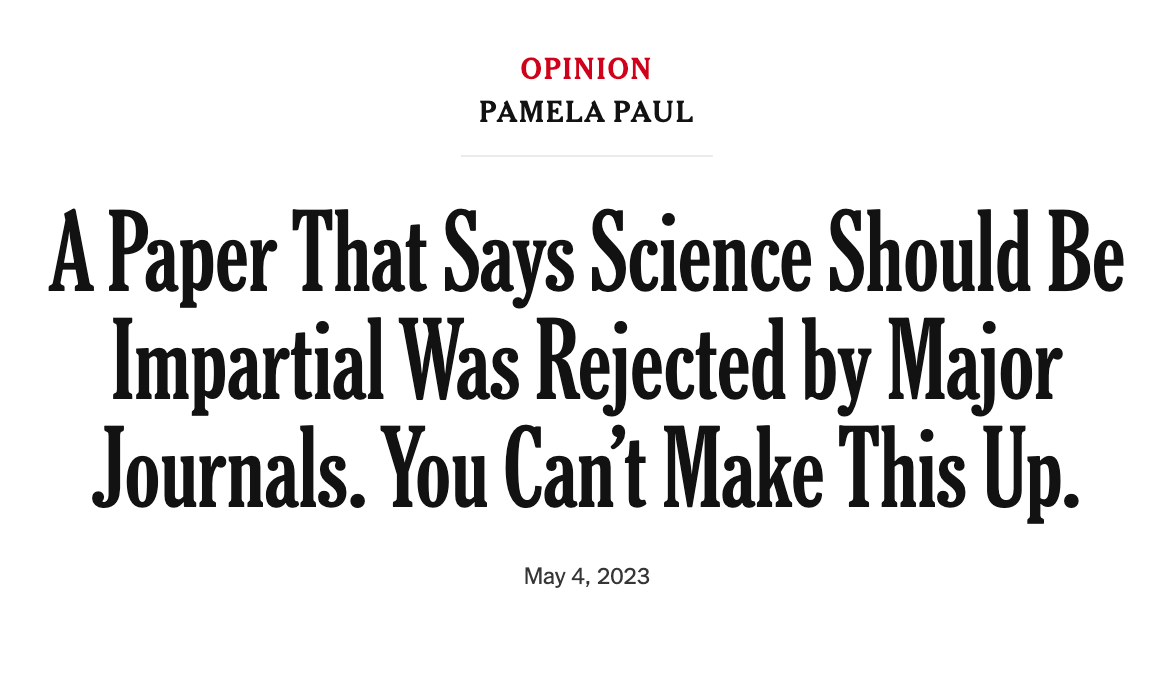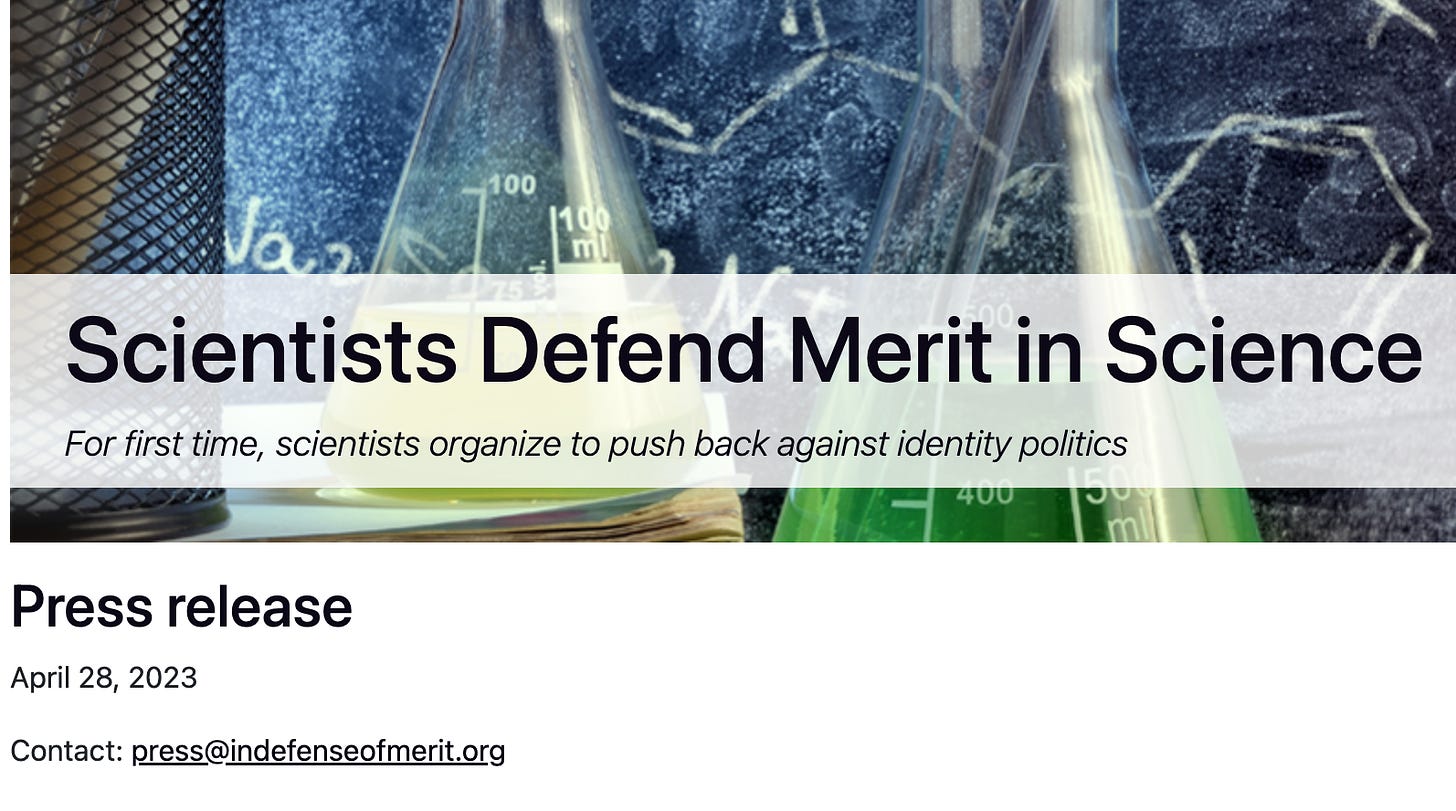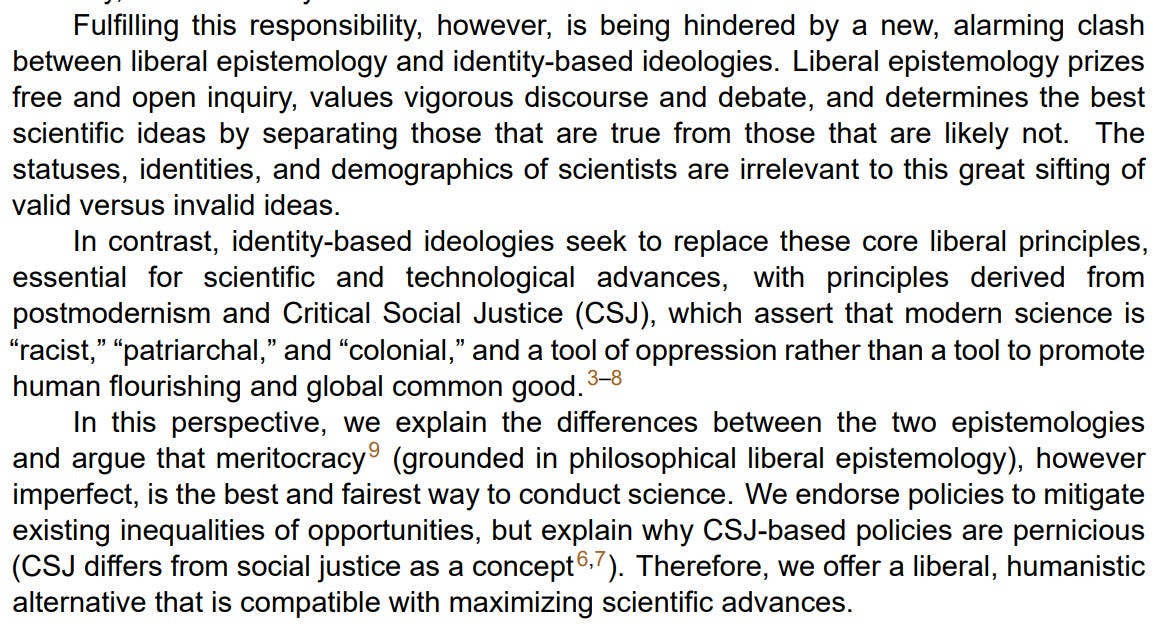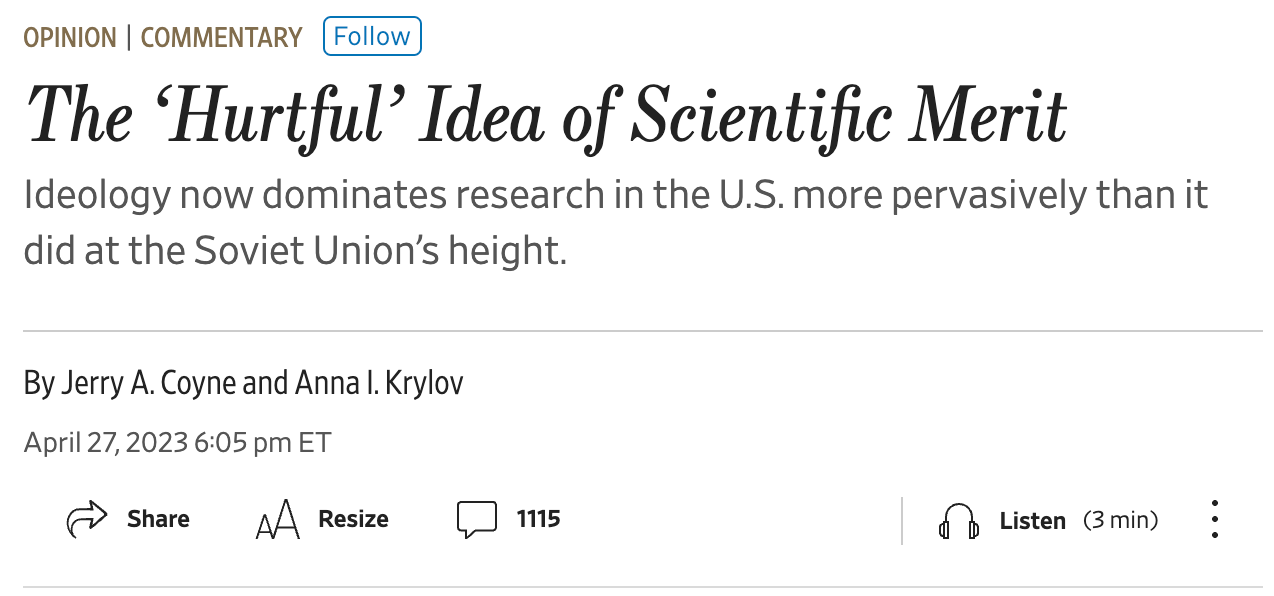Pamela Paul and PNAS Envy
The self-appointed defenders of academic merit can't persuade their peers, but have friends in high places
Lets say you published a book, and it was not reviewed in the New York Times. Unfortunate — but have you been cancelled or censored in some fashion?
No.
Imagine you submitted an op-ed to the Times. Like the vast majority of submissions, it is rejected. Do you take it as a sign that you have been wronged in some way?
If you are sane, functioning human being, the answer is, again, no. Lots of people want to get published, there is finite space, and the publication reserves that space for the topics and authors it thinks achieves its mission.
Academic publishing is a lot like that. Not every publication is the New York Times, but most submissions to major journals end in rejection.
Now read this headline.
What is the headline, and accompanying piece, intended to convey? It is to make you angry about the state of science by asserting that:
a paper arguing for impartial science was unfairly rejected by major journals, and
that the rejection of the paper reflects a rejection of impartial science itself, emblematic of a broader decline in scientific standards
Neither of these claims are true. The author, Pamela Paul, advances these arguments by shading opinion writing (e.g., “these are the right ideas about science”) with factual dishonesty (“this failure to publish this paper in major journals is a sign of the corruption of science”). And this dishonesty is not a one-off, but indicative of a broader pattern of opinion writing in higher education, and one more variation of reactionary anti-wokeness in and about academia.
No, your opinions are not science
The credibility of Paul’s claims relies on the reader’s ignorance of academia. If you know nothing about the field, they might seem plausible. So let me explain a few things as someone who has published a lot and worked as co-editor at a couple of journals.
First, if you submit a paper to a journal, there is no guarantee it will get published. The more prestigious the publication, the harder it is. Academics will generally send their paper to a top journal knowing they have somewhere like a 5-20% chance of acceptance. When you are rejected, you move on to a less selective outlet (the paper in question was finally published in the Journal of Controversial Ideas). You can even just post your papers online, or publish in a vanity journal where you may have to subsidize the costs of publication.
In effect, you cannot be censored. And not being published in the most prestigious journals is not censorship. No selection process is perfect, and sometimes journals make errors. But if your ideas are worthwhile they will find an audience.
The Proceedings of the National Academy of Sciences (PNAS — people pronounce it P-N-A-S rather than attempt to treat it as a single word for what I hope are obvious reasons) is a prestigious journal. It is the literally the journal of the National Academy of Sciences, an entity created by President Lincoln to bring the best academic minds in America together! Most papers submitted to the journal will be rejected. I have been a guest editor for a paper there, and even though the paper was a piece of excellent empirical research it was still rejected because some very good reviewers held it to an absurdly high standard. Them’s the breaks.
Second, journals select not just on quality, but on fit. The have a specific mission and goal. As an author, if you are trying to publish in a journal, you check out the submission guidelines before you submit. Here are the guidelines for PNAS, which specializes on relatively short (6 pages) original empirical papers. Authors can submit even shorter (3 page) opinion pieces. If you don’t have something that falls into these categories, this is probably not the journal for you.
So what did the wronged paper look like? It is a 26 page jeremiad against what the authors see as the failings of modern science.1 It is not original research. There are no hypotheses tested. It claims that science is going to the dogs because of concerns about diversity and fairness. Journals and institutions are faulted for acknowledging uneven treatment of scholars based on identity. The opening line — “We live in an incredible time in human history” — is something a professor might ask an undergraduate student to rethink. It features powerpoint slides plugging books.
You don’t even have to disagree with the ideas in the article to see it as a bad fit with the journal. And the ideas themselves are not novel. The book cited above was published in 1962. Being a bad fit, and lacking novelty, the paper lacks a basis for publication in a top journal.
Pamela Paul is relying on her audience not knowing such basics about academic publishing to generate outrage.
A profound sense of entitlement
The authors themselves include detail about the publication process in their paper. Academics generally do not do this, and it it suggests a certain level of entitlement, a desire to selectively toss around some sour grapes.
To unpack a bit. The authors claim that PNAS has published “critical social justice” papers so they submitted their to PNAS. Which papers they are referring to are not specified, but a quick look at the journal shows there are short opinion pieces or long research papers on the issue of race. But the authors wanted a long opinion piece. My way or the highway, bucko.
The editors offered some framing advice, suggesting that the idea that “merit” has a clear and unambiguous meaning would likely to be contested by reviewers. The authors reject this suggestion, implying that the editor and academics who regularly review for the PNAS, who tend to be very successful scientists who have built careers by publishing high-profile empirical research through blind peer-review processes, don’t care about merit. OK. The editors still sent the paper out for review rather than “desk-reject” it (deciding the paper had such a low chance of acceptance that it would waste the time of reviewers to solicit comments), a courtesy I find surprising given its lack of suitability. The authors do not share the reviews, but focus on one reviewer mentioning “hurtfulness.” In Paul’s column this becomes “downright hurtful” but we can’t really judge the accuracy or context since the authors cherry pick parts of the the review they dislike, but don’t share the rest.
The authors continued with “informal inquiries” i.e., emailing editors to ask if they would publish the paper rather than just submit it and take their chances. This is again unusual. You check if the paper is a good fit with the journal. If it is, you submit. Not for this group! The authors were asking for an editorial endorsement, or special treatment, because they knew the paper was not a good fit for a top scientific journal. Nevertheless, they claim they were unfairly treated, and Paul inaccurately claims the paper “was rejected by several prominent mainstream journals” when it was only reviewed by one major journal.
It doesn’t stop there. The authors issued a press release whose sense of preening self-importance is hard to overstate: “For first time [sic], scientists organize to push back against identity politics.”
It goes on:
The paper describes the current clash in science between classical liberal values, such as merit, and a new postmodern worldview that purports that reality is subjective and can only be understood through a scientist’s "lived experience," which in turn depends on gender, ethnicity, and other immutable characteristics.
Apparently, the scientific community is a pretty simple binary: those who believe in merit, and those who see science as an entirely subjective enterprise, like the National Academy of Science.
The paper itself is not better.
The authors employ the sort of strategies beloved by propagandists like Chris Rufo: brand your enemy negatively (ideological, interested in “critical social justice”) and yourself as the positive alternative (liberal, merit-based). Admit no nuance, pick evidence to fit your argument. Flatten your opponents suggestions — for example, to think about the role of race in medicine through an intersectionality lens — as anti-science. Force readers to pick. Anyone who disagrees with you opposes merit and science. From the paper:
I cannot overstate how condescending this sounds. You might be a scientist who has spent their entire career applying the scientific method but if you are more open to concerns about diversity or institutional bias than the authors, you are branded as anti-science and anti-merit.
To be clear, I think faculty absolutely should have debates about the meaning of merit and the value of diversity in our field. Indeed, we do. All the time. But I don’t think the authors of the PNAS-envy (I’m sorry) paper have their fellow-academics as the target audience in mind when writing this piece. The nature of their argumentation suggests that they have preemptively dismissed most of us as too ideological. Their target audience is bigger. They want university administrators, donors, and politicians to put their thumbs on the scale even when they can’t persuade their peers.
The authors make similarly outlandish claims in venues like the Wall St. Journal. Ideology in science is greater now in the US than it was at the height of Soviet Russia! This seems, to be kind, like a stretch. I doubt that Pravda published many academic critiques of the Communist Party.
The underlying doctrine is not pro-science or pro-speech; it is simply anti-woke
Could Paul have simply been ignorant? This is possible of course. Her biases (she agrees with the authors, is colleagues with one of them, the New York Times opinion writer John McWhorter) may have blinded her. But she is the former editor of the New York Times book section, and a writer at the most sought after opinion page in the world. She knows that scarcity in publication opportunities means that most authors experience rejection. She and her ex-husband (Bret Stephens) also write a lot about higher education and seem to have a network of academics they connect with. So it would have been easy to ask one of them about how academic publishing works, especially when you were centering your whole piece around the idea the paper should have been published in a top journal.
It is hard to give Paul the benefit of the doubt given the rest of the column and her broader track record. For example, she writes:
Positionality statements are a “widespread practice…popular in the social sciences"? Not true. I’ve published maybe 130 social science papers and never once written a positionality statement or been asked to. The two papers Paul cites merely explain the concept — the way in which your identity and experiences might shape how you undertake research or interpret data — which is entirely reasonable, especially for qualitative research methods. It is an effort to check against biases, and I believe has a place in academia. But it is not a “widespread” condition for publication, hiring or tenure.
To be fair to Paul, she is drawing from the authors of the PNAS-envy paper, who mention positionality statements repeatedly as a threat to science without providing some sense of the scale of that threat. In doing so, they mischaracterize remote threats and unusual practices that might have value in a specific setting with more mundane efforts to advance diversity. This represents one more example of them flattening and simplifying arguments, signifying their disinterest in the nuances of research.
I am sympathetic to some of their claims — I think DEI statements are mostly a waste of time, and should not be part of job applications or tenure processes — but it is hard to engage seriously when the authors misrepresent the state of academia, and their colleague's intentions, so profoundly.2
The purpose of op-ed writing is partly to tell you what is important and what is not, and to legitimate certain arguments. For Paul and those like her, the purpose has been to say that wokeness is a greater threat than others. For example, she downplays or ignores government threats to speech and research. Lets take a look at some other salient threats to higher education that arose around the time that Paul was writing her column.
The former President pledged that if he is re-elected he will engage in a massive expansion of federal power over higher education, firing administrators who have diversity responsibilities, and hiring politically-approved accreditors.
Texas joined the list of states seeking to weaken or remove tenure, the bedrock of academic freedom from political interference.
Florida passed another bill restricting attention to the issue of diversity on campus, and continues to politicize higher education leadership, preferring political hacks to qualified educators.
None of these topics got attention in the NY Times editorial page. But the failure of PNAS to publish a paper that did not fit its guidelines commanded space in the opinion page of two national newspapers. Michelle Goldberg wrote about the takeover of New College in Florida and the denial of tenure to faculty there by DeSantis political appointees on April 29. Goldberg is most likely of the Times liberal columnists to write about higher education. By contrast, the conservative columnists, Paul, Bret Stephens, David Brooks and Ross Douthat write about wokeness in higher education constantly. Paul published her column on May 4. The same day Brooks bemoaned the lack of free speech on campus. The next day Douthat wrote about “ideological entrenchment and growing political uniformity” in academia. It never ends.
This is unsurprising if you have been paying attention to how the campus speech wars have played out. The cancellation of a lecture by Dorian Abbott, one of the authors of the PNAS-envy piece, garnered greater attention in the New York Times than the state of Florida illegally telling faculty they could not present their research in legal proceedings if it ran contrary to the interests of the DeSantis regime. The latter seems obviously more important as a threat to education than the former, but the former got more attention because opinion writers at the Times cared more strongly about it.
Paul herself has a track-record of turning the trivial into matters of national importance and downplaying actual politicization of campus. For example, when Stanford University rejected a list of some terms that IT staff came up with as potentially offensive she wrote a column about how it was “seminal moment for academic freedom.” In her very next column she praised the elected official who has done the most to politicize higher education, Ron DeSantis, brushing aside his unconstitutional censorship, as a predictable response to “racial and ethnic divisiveness and the overt politicization of what’s taught in the classroom.” Sounds like the wokes had it coming!
This reflects a broader pattern in the Times, and elsewhere, which is that the opinion page aggressively boosts certain threats as more pressing. (Parker Molloy notes the same pattern in discussion of trans issues). The same people who tell you that wokeness is a threat to free speech are now telling you that wokeness is a threat to science. These are debatable assumptions. As someone who has been on campus for the last 25 years, we have more speech and better variety of perspectives than before (as Thomas Zimmer argues), and standards for scientific achievement keep being ramped up. It is absolutely the case that what it takes to get hired, published or tenured now is greater than it was when I was a grad student. To believe the Paul et al. you also have to accept the notion that most scientists in academia are so captured by ideological blinders that they no longer care about science, a claim which is simply implausible if you spend any time with working researchers.
Paul’s central concern is therefore less a concern with education than an opposition to wokeness, or more specifically, cultural and institutional acknowledgments and corrections for unfairness.
Encouraging the actual politicization of science by actual politicians
The biggest threat to academia is politicization by government officials who have the power to impose their ideological agenda on campus, disempowering higher education professionals. Paul and others are, at best, directing attention away from these threats, and at worst, enabling them. If you spend much of your energy arguing to the public that wokeness is a threat, you facilitated censorious laws like Florida’s Stop WOKE Act. If you argue that diversity is a threat to scientific merit, you enable moral panic entrepreneurs like Chris Rufo who are currently pushing state laws that would eliminate DEI offices in universities.
The people who loudly declare themselves as against the politicization of science are providing the justifications for politicians to interfere in science.
For example, variations on the word “politics” or “politicization” of science occur about 30 times in the PNAS-envy paper. But never once would you learn that US governments are actively censoring faculty for their views. The only political regime we hear about is the Soviets, who are, remember, less bad than people arguing for diversity, equity and inclusiveness today. Politicization, it seems, excludes actual politicians.
The authors call for academic freedom, but are indifferent to the politicians hacking away at that freedom as long as the politicians agree with them. It is not a coincidence that some of the authors are lecturers at the faux University of Austin’s “forbidden topics” course, where they ignore a state government that is actually forbidding faculty at the real University of Texas-Austin from discussing certain topics.
Dave Karpf notes how shared status — the desire to maintain an order where their views are not questioned — goes a long way to explaining the attitude of both the article authors and Paul. It also explains how an unremarkable set of views about the scientific process can land a NYT write-up and Wall St. Journal op-ed. Most academics, including those who publish breaking research in PNAS, dream of their research landing in such platforms, but find the bar is too high. They would be better off setting aside their research and developing the right set of ideological connections it seems.
The authors of the PNAS-envy paper may argue for merit, but they want, and get, special treatment. They are against politicization, but shrug their shoulders at the most dangerous type of politicization. In doing so they enable the removal of ability for most faculty and students to engage in real debate about what the appropriate norms are for campus, pushing those decisions to politicians looking to score cheap culture-war points.
It is possible that the authors originally submitted a 3-page opinion piece to PNAS, and later extended it 26 pages. If so, the fit issue I raise is less germane. But they do not mention this is explaining their rejection, even as they selectively focus on other factors, and make clear they ignored editorial guidance.
My skepticism for DEI statements is perhaps for a different reason than that of the authors. I am suspicious of bureaucratic requirements that serve no functional point, and I increasingly think that many DEI initiatives on campus are to allow faculty and stakeholders point to symbols of change in the absence of more fundamental change.










What I found on checking the footnotes in the article is that there is a persistent exaggeration or misrepresentation involved. For example, I pointed out in my own dissection is that there's a claim made further in that pharmaceutical curricula are being changed to incorporate indigenous remedies and folk medicines in the place of existing biomedical research into pharmaceuticals, but when you look at the citation, it's a profile of a relative handful of Black South African researchers who advocate for more research into indigenous medicines and more attention to indigenous medicines in teaching in order to inspire more Black South Africans to pursue pharmaceutical and pharmacological training. So this is one country; it's a small subset of existing researchers; it's advocacy; South African curricula in these topics at the country's main universities remains basically unchanged, with a bit of attention around the edges to indigenous healing practices. Moreover, the fynbos biota of the Western Cape is widely recognized not only as a unique, under-researched ecology but has already provided at least one plant-based remedy whose modest value has been confirmed by clinical trials (topical applications of aloe). By the authors' own description of scientific research, they ought to welcome research into those indigenous remedies--that's the whole point of pluralism, right? They argue for merit, not some kind of efficiency function that requires all researchers everywhere to be working on a single, solitary approach that is thought to provide the best outcomes. So it's odd enough that they find this *one* profile that threatening--and don't spend any time at all actually evaluating the current state of pharmaceutical and pharmacological practice and instruction in South Africa. But they imply in the body of the article that they're talking about a general shift in scientific practice--or an American one. Which means they're either incredibly sloppy citationally or they're intentionally trying to deceive.
Thank you for your carefully crafted insights outlining the limits and ideologically driven article and op Ed. Your discussion of the research submission process and double blind review process. Your discussion brilliantly highlights the limits of this attack on the process that produces credible research.